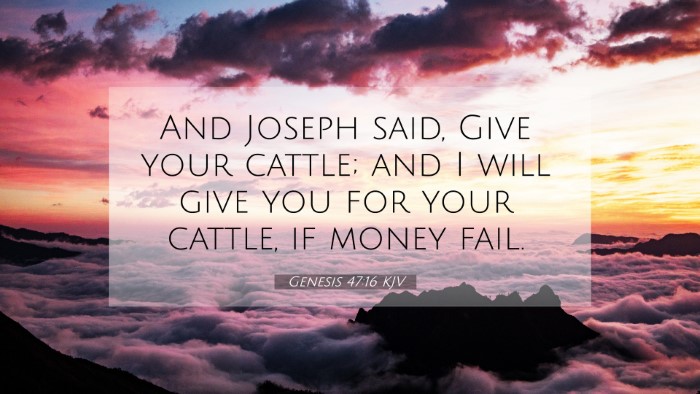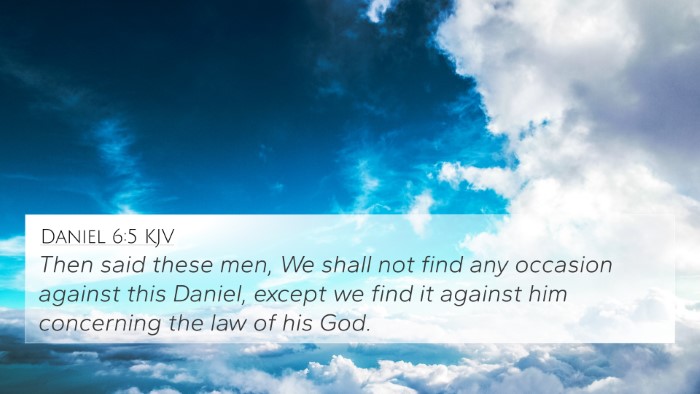Understanding Genesis 47:16
The verse Genesis 47:16 states: "And Joseph said, Give your cattle; and I will give you for your cattle, if money fail." This passage reflects a crucial moment during the famine in Egypt. Joseph, as Pharaoh’s representative, is implementing a system of exchange that demonstrates both his wisdom and the economic challenges faced by the people.
Contextual Background
In this narrative, Joseph had risen to power in Egypt, orchestrating granaries during seven years of abundance to prepare for the coming seven years of famine, as foretold in Pharaoh’s dream. The famine caused widespread starvation, leading the people of Egypt to seek help and thus fall under Joseph's economic strategies.
Commentary Insights
-
Matthew Henry: Henry highlights Joseph's practical solution, emphasizing the moral duty to aid where one is able, even in dire circumstances. Joseph shows prudence and compassion by providing for those who have lost all their means.
-
Albert Barnes: Barnes notes the significance of cattle as a form of wealth and sustenance. He suggests that this transaction illustrates the desperate state of the populace. The exchange system instituted by Joseph serves as a pragmatic response to economic hardship.
-
Adam Clarke: Clarke stresses the transformative nature of this period in Egypt. He explains that this economic strategy not only provided immediate relief but also established a new dependence of the people on the crown, showing Joseph's foresight in political and economic governance.
Thematic Bible Verse Connections
Genesis 47:16 provides a rich ground for cross-referencing with other biblical texts that illuminate themes of provision, stewardship, and the role of leadership in times of crisis. Here are several related verses:
-
Proverbs 21:20: "There is treasure to be desired and oil in the dwelling of the wise; but a foolish man spendeth it up." This reflects the wisdom in saving and resource management.
-
Genesis 41:30-31: Joseph's interpretation of Pharaoh's dream regarding the seven years of famine parallels the events in 47:16 where famine leads to economic exchange.
-
Acts 2:45: Referring to the early Christians who sold possessions to provide for each other, similar to the communal response during famine.
-
Matthew 25:35-40: The parable of the sheep and goats where caring for others is shown as serving God, reflecting Joseph's act of providing for the needy.
-
James 2:15-17: Discusses faith without works, emphasizing the necessity of actions—mirroring Joseph's engagement with the plight of the Egyptians.
-
Psalm 37:25: "I have been young, and now am old; yet have I not seen the righteous forsaken, nor his seed begging bread." This verse reassures God's provision in hard times.
-
2 Corinthians 9:8: "And God is able to make all grace abound toward you; that ye, always having all sufficiency in all things, may abound to every good work." God’s ability to provide could be seen in Joseph's actions during the famine.
Cross-Referencing Biblical Texts
Cross-referencing biblical texts enriches the understanding of Genesis 47:16, allowing us to see how various scriptures interact and resonate with similar themes through the lens of economic exchange, provision, and leadership ethics.
Applying Cross-References for Deeper Understanding
When approaching Genesis 47:16, consider exploring:
-
How does this verse connect to the key themes found in Proverbs regarding wisdom and wealth?
-
What parallels can be drawn between Joseph's actions and New Testament teachings on community support?
-
In what manner can we interpret this situation in light of God's providential care as seen throughout scripture?
Conclusion
Genesis 47:16 stands as a testament to both the wisdom of Joseph and the necessity of wise stewardship in times of crisis. Through the combined insights from public domain commentaries and relevant cross-references, we can appreciate the depth of this scriptural account, understanding its broader implications in biblical themes of provision, responsibility, and community care. Engaging in comparative Bible verse analysis reveals an inter-Biblical dialogue that continues to speak to our modern circumstances.







